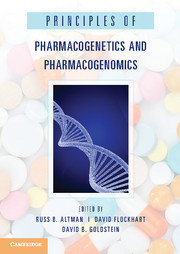Book contents
- Frontmatter
- Contents
- Contributors
- Introduction
- I Critical Concepts
- II Therapeutic Areas
- 10 Oncologic Drugs
- 11 Pharmacogenetics and Pharmacogenomics of Cardiovascular Disease
- 12 Statin-Induced Muscle Toxicity
- 13 Genomics of the Drug-Induced Long-QT Syndrome
- 14 Pharmacogenetics of Diabetes
- 15 Pharmacogenetics – Therapeutic Area – Respiratory
- 16 Pharmacogenomics Associated with Therapy for Acid-Related Disorders
- 17 Pharmacogenetics of Rheumatology: Focus on Rheumatoid Arthritis
- 18 Pharmacogenetics of Obstetric Therapeutics
- 19 Pharmacogenomics of Psychiatric Drugs
- 20 Pain and Anesthesia
- 21 HIV and Antiretroviral Therapy
- 22 Application of Pharmacogenetics and Pharmacogenomics in Pediatrics: What Makes Children Different?
- References
11 - Pharmacogenetics and Pharmacogenomics of Cardiovascular Disease
from II - Therapeutic Areas
Published online by Cambridge University Press: 05 June 2012
- Frontmatter
- Contents
- Contributors
- Introduction
- I Critical Concepts
- II Therapeutic Areas
- 10 Oncologic Drugs
- 11 Pharmacogenetics and Pharmacogenomics of Cardiovascular Disease
- 12 Statin-Induced Muscle Toxicity
- 13 Genomics of the Drug-Induced Long-QT Syndrome
- 14 Pharmacogenetics of Diabetes
- 15 Pharmacogenetics – Therapeutic Area – Respiratory
- 16 Pharmacogenomics Associated with Therapy for Acid-Related Disorders
- 17 Pharmacogenetics of Rheumatology: Focus on Rheumatoid Arthritis
- 18 Pharmacogenetics of Obstetric Therapeutics
- 19 Pharmacogenomics of Psychiatric Drugs
- 20 Pain and Anesthesia
- 21 HIV and Antiretroviral Therapy
- 22 Application of Pharmacogenetics and Pharmacogenomics in Pediatrics: What Makes Children Different?
- References
Summary
Scope of Cardiovascular Therapeutics
An estimated 81 million American adults (37.1 percent) have cardiovascular disease (CVD), including coronary artery disease, hypertension, congestive heart failure, and stroke (1). CVD accounts for 36.3 percent of all deaths in the United States (2,400 deaths daily) and is the most common cause of death in developed countries. These chronic diseases usually require lifelong drug treatment, and medications for their treatment or prevention are among the most commonly prescribed drugs worldwide.
Hypertension, congestive heart failure, and other CVDs are often considered as discrete entities, but are, in fact, complex and heterogeneous syndromes mediated by many different pathophysiological mechanisms that eventually result in a similar clinical picture. As a result, clear and reproducible identification of environmental and genetic factors that contribute to these multifactorial diseases is challenging. Adding to the challenges, there is large variability, only a portion of which is genetically determined, among patients in their responses to a drug for a particular disease.
- Type
- Chapter
- Information
- Principles of Pharmacogenetics and Pharmacogenomics , pp. 115 - 124Publisher: Cambridge University PressPrint publication year: 2012



